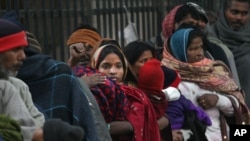NEW DELHI —
India’s government has announced measures to control rising food prices. The government came to power last month on promises of reining in inflation, but a spike in food and fuel prices pose a challenge.
As inflation in the month of May climbed to six percent, the government promised immediate action to keep a lid on food prices.
Finance Minister Arun Jaitley says the government will impose restrictions on hoarding, the export of some items, and will track prices of essential commodities.
“Minimum export price in relation to potatoes will be fixed, also with regard to onions, additional quantities of rice will be released into the market," said Jaitley. " Even though the increase has only been marginal, we do not want anybody to exploit the situation and therefore in anticipation of any further market reaction, a series of these steps have been decided.”
To discourage exports of onions, the government has doubled the minimum export price to $300 per ton. Onions, used as the base for Indian curries, are a hugely politically sensitive crop in India and rising prices usually trigger massive public anger.
An increase in food prices was a major reason for the downfall of the former Congress-led government. That is why inflation, which is at a five month high, is worrying the new Bharatiya Janata Party government, which has made controlling food prices and reviving the economy its top priority.
There are fears prices could continue to climb, because of forecasts that weak monsoon rains may hit crop production in the country of 1.2 billion people. The government is also gearing for a shortfall in production of summer crops such as rice and cotton.
But economist D.H. Pai Panindiker, with RPG Goenka Foundation in New Delhi, says it may be hard to control prices of vegetables and fruits, but the government has ample stocks of rice and wheat, the country’s staple diet.
“I think government has enough stocks of food grain, that is one advantage government has, but these must be used in time to check rising food prices," said Panindiker. "More effective measures are really stopping exports, importing wherever necessary whatever you can import and the release of stocks in time in the market.”
The government, which came to the helm three weeks ago, faces a tough challenge in the coming months as it tries to revive economic growth that has fallen below five percent. Besides food prices, rising global oil prices due to the crisis in Iraq have added to the woes of a country that imports most of its oil.
The higher oil prices could add a crippling $3 billion to the government’s bill for subsidizing fuels such as kerosene and diesel.
As inflation in the month of May climbed to six percent, the government promised immediate action to keep a lid on food prices.
Finance Minister Arun Jaitley says the government will impose restrictions on hoarding, the export of some items, and will track prices of essential commodities.
“Minimum export price in relation to potatoes will be fixed, also with regard to onions, additional quantities of rice will be released into the market," said Jaitley. " Even though the increase has only been marginal, we do not want anybody to exploit the situation and therefore in anticipation of any further market reaction, a series of these steps have been decided.”
To discourage exports of onions, the government has doubled the minimum export price to $300 per ton. Onions, used as the base for Indian curries, are a hugely politically sensitive crop in India and rising prices usually trigger massive public anger.
An increase in food prices was a major reason for the downfall of the former Congress-led government. That is why inflation, which is at a five month high, is worrying the new Bharatiya Janata Party government, which has made controlling food prices and reviving the economy its top priority.
There are fears prices could continue to climb, because of forecasts that weak monsoon rains may hit crop production in the country of 1.2 billion people. The government is also gearing for a shortfall in production of summer crops such as rice and cotton.
But economist D.H. Pai Panindiker, with RPG Goenka Foundation in New Delhi, says it may be hard to control prices of vegetables and fruits, but the government has ample stocks of rice and wheat, the country’s staple diet.
“I think government has enough stocks of food grain, that is one advantage government has, but these must be used in time to check rising food prices," said Panindiker. "More effective measures are really stopping exports, importing wherever necessary whatever you can import and the release of stocks in time in the market.”
The government, which came to the helm three weeks ago, faces a tough challenge in the coming months as it tries to revive economic growth that has fallen below five percent. Besides food prices, rising global oil prices due to the crisis in Iraq have added to the woes of a country that imports most of its oil.
The higher oil prices could add a crippling $3 billion to the government’s bill for subsidizing fuels such as kerosene and diesel.




